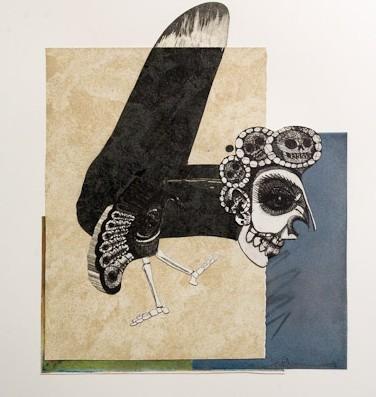If there's any one thing that really separates humans from most other animals, it's our ability to get funky. When's the last time you saw a lion, or a giraffe, or even a chimpanzee, do the Funky Chicken or the Electric Slide? But there is one other species that can hold its own on the dance floor—birds.
如果真有一件事情能将人类与其它大多数动物区分开来的话,那就是人类具有跳舞的能力。你什么时候看到过一头狮子,或者一只长颈鹿,甚至是一个大猩猩在跳小鸡舞或者滑步舞?然而有一种动物——鸟类能够拥有自己的舞池。

A few studies have shown that some parrots and cockatoos can bob their heads and sway in time to music. Do a YouTube search for “dancing birds” and see for yourself.
几项研究表明,有些鹦鹉和凤头鹦鹉会合着音乐节拍摇头晃脑,左右摇摆。在 YouTube 上搜索“跳舞鸟”,你就会亲眼看到。
So why are birds rhythmically endowed and not, say, chimps, our closest animal relatives? Probably because birds, unlike chimps, but like people, can mimic sounds. When a parrot squawks out a human phrase or impersonates a sound effect, it's doing two things: processing the sound it hears, and monitoring the sound it makes in imitation.
为什么鸟类被赋予了韵律感,而与人类亲缘最近的黑猩猩却没有?也许是因为鸟类能像人类一样模仿声音,而黑猩猩则不能。当一只鹦鹉粗声模仿人们说话或者一个声音效果时,会做两件事:首先,处理听到的声音;其次,监测模仿时发出的声音。
Something similar goes on when we dance—we hear the music, and also somehow coordinate our bodies to move in time to it. In fact,scientists speculate that humans evolved the ability to dance as a by product of learning to speak by imitating sounds. Or maybe dancing evolved alongside sound mimicry. In any case, it's interesting that the only animals besides humans that can dance are birds that mimic sound. It suggests that the two traits are related.
人们跳舞的过程也类似——听到音乐,然后以某种方式协调身体跟上节拍。实际上科学家们推测,人类通过模仿声音而学习说话衍生出了一个副产品——跳舞的能力。或许,跳舞是伴随着声音模仿一同进化的。无论如何,除了人类之外能跳舞的动物只有模仿声音的鸟类,这听起来很有趣。这表明模仿声音和跳舞这两个特征是有联系的。













